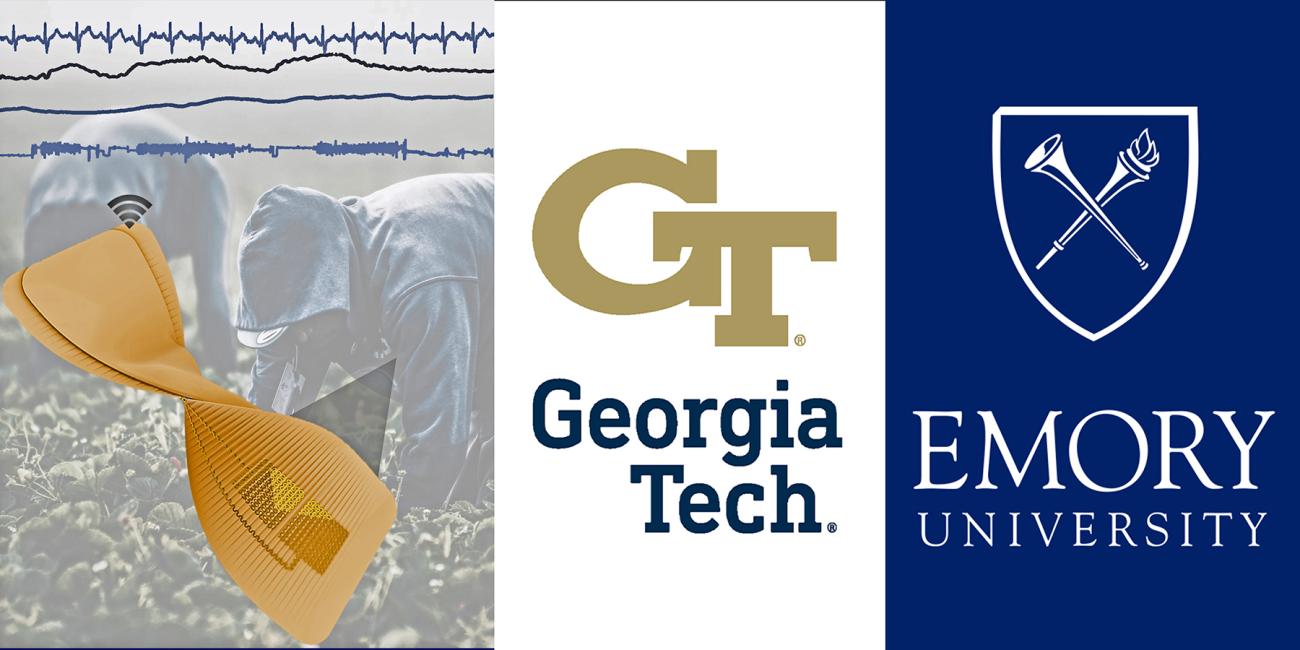By Melanie Kieve
The National Institute of Environmental Health Sciences has awarded a $2.46 million grant to Emory University and Georgia Institute of Technology researchers to develop a multi-sensor biopatch for farmworkers that can predict symptoms of heat-related illness, dehydration, and acute kidney injury.
The four-year grant will allow the team to develop a wearable wireless unit for farmworkers with sensors that can integrate key physiological signals, predict adverse heat-related medical events, and generate warnings about them in real time.
“When you think about people who work outside all day, and that includes construction workers and landscapers as well as farm workers and others, they are exposing themselves to potentially dangerous heat-related conditions,” says W. Hong Yeo, a Woodruff Faculty Fellow and associate professor in mechanical and biomedical engineering at Georgia Tech, and one of the principal investigators on the project, who is leading development of the biopatch.
The findings of the project will lead to an intervention study in which data are sent from the biopatch to an Android device. The team will develop artificial intelligence (AI) tools for predicting study outcomes. In future research, the team envisions that data sent to the Android from the biopatch will be processed with these tools. After processing, warnings may be sent to workers from the Android device as necessary, which will help determine if the technology can reduce morbidity associated with occupational heat exposure.
Escalating trends of increasing environmental temperatures place marginalized populations, such as agricultural workers who have routine occupational exposure to hot, humid environments, at increased risk for the acute health effects of heat exposure, according to Vicki Hertzberg, lead principal investigator on the project and a professor at the Emory University Nell Hodgson Woodruff School of Nursing.
“Heat-related illness and dehydration are particularly insidious, as they can quickly progress from moderate discomfort to confusion and impaired judgment, thereby diminishing the affected worker’s ability to seek necessary medical attention,” she says. “A hand-held device with clear information about heat illness will help farmworkers know when to seek help.”
Joining Hertzberg and Yeo as a principal investigator is Li Xiong, a Samuel Candler Dobbs professor in the Emory Department of Computer Science. Xiong will lead the development of prediction models associated with the research, and Yeo will lead the development of the biopatch.
“We know that once we can get continuous physiological data in real time, then we can prevent this problem,” says Yeo, a Woodruff Faculty Fellow and associate professor in mechanical and biomedical engineering at Georgia Tech, who also is director of the Georgia Tech IEN Center for Human-Centric Interfaces and Engineering. “Currently, it’s very hard to measure real-time events because of the limitations of existing sensor or device technology.”
Conventional wearable devices tend to be rigid, heavy, and bulky – not useful for workers who spend a lot of time moving around.
“All of that motion means we’re losing data, so we’re creating a reliable solution,” says Yeo, whose Bio-Interfaced Translational Nanoengineering Group has specialized in the development of soft, wearable health monitors that use stretchable electronics.
Xiong adds, “Once we have these continuous data, then the challenge is how to fuse these multimodal data in real time and make reliable predictions for interventions. I’m looking forward to working with the team to develop the AI tools and test them in the field.”
Emory School of Nursing assistant professor Roxana Chicas will lead the field team assessing the use of the biopatch on outdoor workers, and Jeff Sands, professor in the Emory Department of Medicine and director of the Emory University Division of Renal Medicine, will provide renal expertise. Completing the team is Nezahualcoyotl Xiuhtecutli, executive director of the Farmworker Association of Florida. The association and the School of Nursing have had a strong partnership in community-based research among Florida farmworkers.
Latest BME News
Jo honored for his impact on science and mentorship
The department rises to the top in biomedical engineering programs for undergraduate education.
Commercialization program in Coulter BME announces project teams who will receive support to get their research to market.
Courses in the Wallace H. Coulter Department of Biomedical Engineering are being reformatted to incorporate AI and machine learning so students are prepared for a data-driven biotech sector.
Influenced by her mother's journey in engineering, Sriya Surapaneni hopes to inspire other young women in the field.
Coulter BME Professor Earns Tenure, Eyes Future of Innovation in Health and Medicine
The grant will fund the development of cutting-edge technology that could detect colorectal cancer through a simple breath test
The surgical support device landed Coulter BME its 4th consecutive win for the College of Engineering competition.








